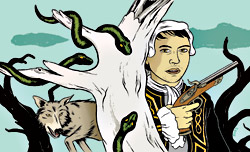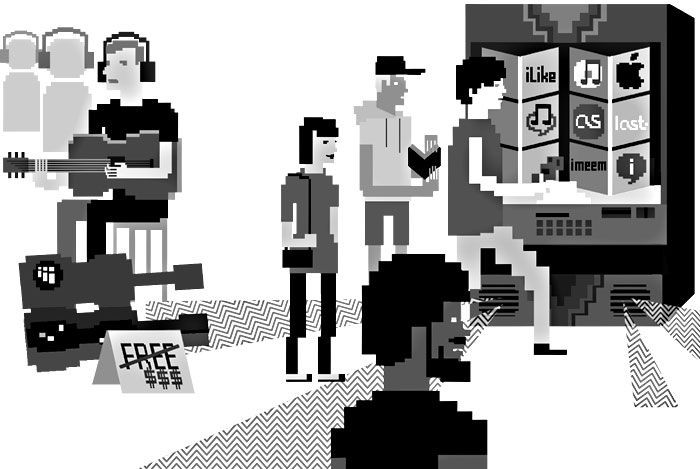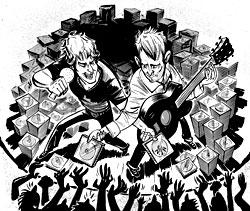Spencer Krug is the peer of Danny Elfman, Tim Burton, and Roald Dahl just as much as he is a Bowie man. “I’ll Believe in Anything,” the Krug-penned song from Wolf Parade’s Apologies to the Queen Mary, is a good place to start: It opens with octave-jumping keyboards before adding the simple thump of a drum, then a few haunting, distorted notes—its dueling keyboards slightly offbeat, the song seemingly at war with itself—before making the simple declaration: “Give me your eyes /I need sunshine.”
In the song’s video, the band prances about in the powdered-wig and corset era, engaged in a series of escalating duels that culminates with a chicken getting shot by a cannon.
Some of the genius behind Apologies was in the ongoing tension of the songs; the album alternated between those written by Krug and ones by fellow frontman Dan Boeckner. While Boeckner’s songs are more even-keeled and consistently rock-driven (think “Modern World”), Krug is the glitchy wild card, fond of beginning with modal leaps and melodic bounds. But Krug’s world of fractured fairy tales—in which the absurdities of adulthood are juxtaposed with a childlike spirit of play—doesn’t end with Wolf Parade.
He already has a few albums under his belt as the singer-songwriter of Sunset Rubdown. In the first album, 2005’s Snake’s Got a Leg, another version of “I’ll Believe in Anything” appears and doesn’t hide behind Isaac Brock’s production or contrast with Boeckner’s smoother sounds. It’s a more uneven, lo-fi effort that bespeaks its skeletal beginnings as a series of four-track experiments in Krug’s room.
For Sunset Rubdown’s second full-length release—last year’s Shut Up I Am Dreaming—he enlisted the help of Jordan Robson Cramer, Mike Doerkson, and former Pony Up! member Camilla Wynne Ingr. A spirit of collaboration and production rounds out his recordings, the most recent of which is a five-song Sunset Rubdown EP released late last year.
But a Krug song is still a Krug song, each capped by the shaky, manic vocals often compared to David Bowie, prone to fits of howling. He’s also one for haunting landscapes, songs at war with themselves, sequels, and nightmarish imagery.
A dreamlike, creepy ambience speckles Krug’s world—think of Apologies‘ seven-plus-minute track, “Dinner Bells.” “I’m Sorry I Sang on Your Hands That Have Been in the Grave” showcases the slow and melodic drive of bells, glockenspiels trapped in purgatory, floating above a faraway landscape.
He seems to require at least one such lengthy song per album. But they’re not all one-beat: “Shut Up I Am Dreaming of Places Where Lovers Have Wings” keeps you hanging on; xylophone, a low-lying rumble of piano, and the occasional swelling of guitar graze for five minutes as he bemoans, “Oceans never listened to us anyway,” before giving up, whispering “Don’t make a sound.” But, of course, that’s when the song erupts and you remember why you have ears in the first place.
“Hope You Don’t Stoop to Dirty Words” is a warbly and unsteady soundscape, a perfect song for taking a walk right after the apocalypse. “A Day in the Graveyard,” from the EP, is a radiant instrumental for a lovely summer-time jaunt, possibly the closest you’d want to come to sharing one of his songs with a loved one—but unless you’re a ghost (or Winona Ryder circa Beetlejuice), “A Day in the Graveyard” isn’t quite the name of a love song.
Production and a band can’t soften Krug’s images. He conjures ghost tricks, growing crises underfoot, whales, ghosts, guns, bones, graveyards, and eyes burning in fires every chance he gets; snakes are omnipresent. While they’re all real, physical dangers of the world, they’re also stereotypical childlike fears. Depending on the song or your mood, Krug seems to be whispering like a scared child constantly bucking or dealing with authority (he is his father’s son, after all), or an adult singing about our most primal fears out where everyone can hear them. He’s not above doubting J.C., as in “The Empty Threats of the Little Lord,” when he fears the “snakes out in the night.” But he makes it out alive.
The chorus of Shut Up‘s “They Took a Vote and Said No,” is straight out of Alice in Wonderland: “They took his kids, he was right/They took his ears, they took his eyes/They said a ride is never free/He couldn’t hear, he couldn’t see/There are things that have to die/So other things can stay alive/The fire burns, it burns to give/It has to burn a life to give. The other men spoke low/They took a vote and said no…If the fire doesn’t die/Can the kid keep his eyes?… I said be careful what you wish for/Oh be careful….” But behind this, all is well in the music as an upbeat, rollicking rhythm triumphantly marches on. And then there’s the authority-defying album title itself: Shut Up I Am Dreaming.
Just as “I’ll Believe in Anything” appears twice in the Krug catalog, a few others show up again from a different angle, beginning from a different phase. Each re-envisions the same world, much as the songs themselves, as he seems to revisit childhood in his lyrics; the later ones are typically more grown-up and radio-friendly, more accessible with added instrumentation and harmony. The first “Stadiums and Shrines” appears on Snake‘s, while “Stadiums and Shrines II” is the first song on Shut Up I Am Dreaming, pronouncing: “There’s a kid in there/And he’s big and he’s dumb and he’s kind of scared/And he’s too old to be there.”
“Three Colours” I and II appear on the EP, providing a contrast that’s nearly as great as it is on both versions of “I’ll Believe in Anything,” both beginning with the octave-skipping keyboards once again before fleshing out with more; the second in the series is more lush from the beginning. But both songs seem to be fighting themselves, driven by a wild, even ill-defined beat that’s slightly askew, all but masked in the rhythmic drive.
“Do you believe that you belong to something?” Krug moans in “Three Colours II,” before fading out to a multitrack of other Krugs, as if his voice alone could accompany itself. “I can’t believe that I belong to nothing.”








